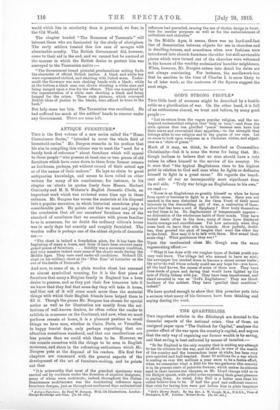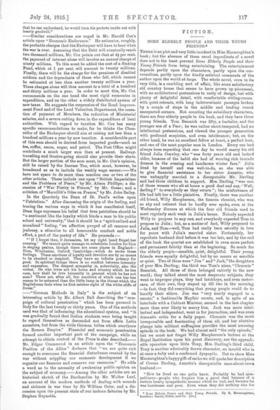THE QUARTERLIES.
Two important articles in the Edinburgh are devoted to the financial aspects of the national crisis. One of these, an unsigned paper upon " The Outlook for Capital," analyses the precise effect of the war upon the country's capital, and argues that the only way of regaining our former wealth is by saving, and that saving is best enforced by means of taxation :—
" Bo far England is the only country that is making any attempt to tax its citizens for the war, and its effort, in view of the wealth of the country and the tremendous issue at stake, has been very poor-spirited and half-hearted. Some 70 millions for a war which is costing us over 900 millions a year seem to be a feeble effort, when we remember what a field for the tax-gatherer this oountry is in its present state of patriotic fervour, which makes its eitisens send in their income-tax cheques, as Mr. Lloyd George told us in his Budget speech, with polite notes expressing their great pleasure in paying them. As usual, John Bull is a better man than his rulers believe him to be. If half the good and sufficient reasons that exist for taxing him were put before him in plain language God's Strorq People. By the Rev. A. W. Gough, M.A., F.R.S.L., Vicar el Bronipton, S.W. London : Robert Scott. [2s. 6d. nat.]
that he can understand, he would turn his pockets inside out with hearty goodwill."
—Similar considerations are urged in Mr. Harold Cox's article upon "Economic Endurance." He estimates, roughly, the probable charges that the Exchequer will have to bear when the war is over. Assuming that the Debt will eventually reach two thousand millions, Mr. Cox points out that at 4it per cent.
the payment of interest alone will involve an annual charge of ninety millions. To this must be added the cost of a Sinking Fund, which at 1 per cent. will amount to twenty millions.
Finally, there will be the charge for the pensions of disabled soldiers and the dependants of those who fall, which cannot be estimated at less than another twenty millions a year.
These charges alone will thus amount to a total of a hundred and thirty millions a year. In order to meet this, Mr. Cox recommends on the one hand the most rigid economies in
expenditure, and on the other a widely distributed system of new taxes. He suggests the suspension of the Road Improve- ment Fund and of the Land Valuation Department, the cessa- tion of payment of Members, the reduction of Ministerial salaries, and a severe cutting down in the expenditure of local authorities. With regard to taxation Mr. Cox has many specific recommendations to make, for he thinks the Chan- cellor of the Exchequer should aim at raising not less than a hundred millions a year by new taxation. A. considerable part of this sum should be derived from imported goods—such as tea, coffee, cocoa, sugar, and petrol. The Post Office might
contribute a much larger sum than at present. Railway- travelling and theatre-going should also provide their share. But the larger portion of the mum must, in Mr. Cox's opinion, still he raised by the Income Tax, which must, however, be
broadened so as to include the weekly wage earner.—We have not space to do more than mention one or two of the other articles. These include one upon " British Imperialism and the Problems of Peace," by Mr. Alison Phillips; a dis- cussion of " War Poetry in France," by Mr. Goalie; and a
criticism of "Meredith's Odes on France," by Mr. John Bailey.
In the Quarterly the Dean of St. Paul's writes upon "Patriotism." After discussing the origin of the feeling, and tracing the various ways in which it has manifested itself, Dean Inge expresses his belief that true patriotism should be "a sentiment like the loyalty which binds a man to his public school and university," that it should be a "spiritualized and moralized " feeling, " an affection purged of all rancour and jealousy, a stimulus to all honourable conduct and noble effort, a part of the poetry of life." He proceeds :—
"' If I forget thee, 0 Jerusalem, let my right hand forget her cunning.' We cannot quite manage to substitute London for Zion in singing psalms, though there are some places in England— Eton, Winchester, Oxford', Cambridge—which do evoke these feelings. These emotions of loyalty and devotion are by no means to be checked or despised. They have an infinite potency for good. In spiritual things there is no conflict between intensity and expansion. The deepest sympathy is, potentially, also the widest. He who loves not his home and country which he has Peen, how shall he love humanity in general which he has not seen P There are, after all, few emotions of which one has less reason to be ashamed than the little lump in the throat which the Englishman feels when he first catches sight of the white cliffs of Dover."
—" German Methods in Italy" is the subject of an interesting article by Mr. Albert Ball describing the "cam- paign of cultural penetration" which has been pursued in Italy for the last twenty or thirty years. One of the methods
used was that of influencing the educational system, and "it was gradually found that Italian students were being taught to regard themselves as descended not from effete Latin ancestors, but from the virile German tribes which overthrew the Roman Empire." Financial and economic penetration formed another important part of the campaign, while an attempt to obtain control of the Press is also described.— Mr. Edgar Crammond in an article upon the "Economic
Position of the Allies" declares that "we are quite rich enough to overcome the financial disturbance created by the war without crippling our economic development if we organize our finances and conserve our resources." He adds a. word as to the necessity of awakening public opinion on the subject of economy.—Among the other articles are an historical sketch of the Dardanelles by Mr. Walter Leaf, an account of the modern methods of dealing with wounds and sickness in war time by Sir William Osler, and a dis- cussion upon the present state of our inshore fisheries by Mr. Stephen Reynolds.



































 Previous page
Previous page